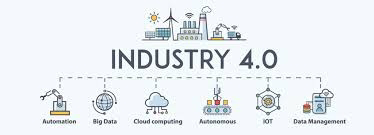Industry 4.0, also known as the Fourth Industrial Revolution, represents a significant shift in the way manufacturing and industries operate. It's characterized by the integration of digital technologies, automation, data analytics, and the Internet of Things (IoT) into various aspects of industrial processes. Here are some key aspects of Industry 4.0:
1. Smart Factories: Industry 4.0 envisions smart factories where machines and systems are interconnected through the IoT. This connectivity allows for real-time monitoring and control, optimizing production, and reducing downtime.
2. Data Analytics: Data is a cornerstone of Industry 4.0. Advanced analytics and machine learning algorithms are used to process the vast amount of data generated in these smart factories, enabling predictive maintenance and better decision-making.
3. Automation and Robotics: Automation plays a vital role in Industry 4.0. Robots and automated systems can perform tasks with high precision and efficiency, reducing the need for human intervention in routine processes.
4. Cyber-Physical Systems: The integration of physical systems with digital technology is a fundamental element. This includes sensors, actuators, and software that interact with the physical world.
5. Additive Manufacturing: 3D printing is a key technology in Industry 4.0, allowing for the rapid prototyping and customization of products.
6. Supply Chain Optimization: Digitalization allows for a more agile and efficient supply chain. Manufacturers can better track inventory, forecast demand, and coordinate with suppliers in real time.
7. Human-Machine Collaboration: While automation is a significant part of Industry 4.0, there's also an emphasis on human-machine collaboration. Workers can use augmented reality and wearable technology to enhance their skills and work more efficiently.
8. Sustainability: Industry 4.0 technologies can contribute to sustainability efforts. By optimizing processes and reducing waste, manufacturers can have a more environmentally friendly impact.
9. Security and Privacy Challenges: With increased connectivity, there are also concerns about data security and privacy. Protecting sensitive information and systems from cyber threats is a critical consideration.
Industry 4.0 has the potential to revolutionize manufacturing and various industries, making them more efficient, flexible, and responsive to customer needs. However, it also requires significant investments in technology and training to fully realize its benefits.
#industry4 #iot #iiot #smartfactory #sustainability #automation #internetofthings #industrialinternetofthings #businessexcellence


No comments:
Post a Comment